MACH Alliance Empowers Gender Equality with New Women in MACH DEIB Scoring Tool
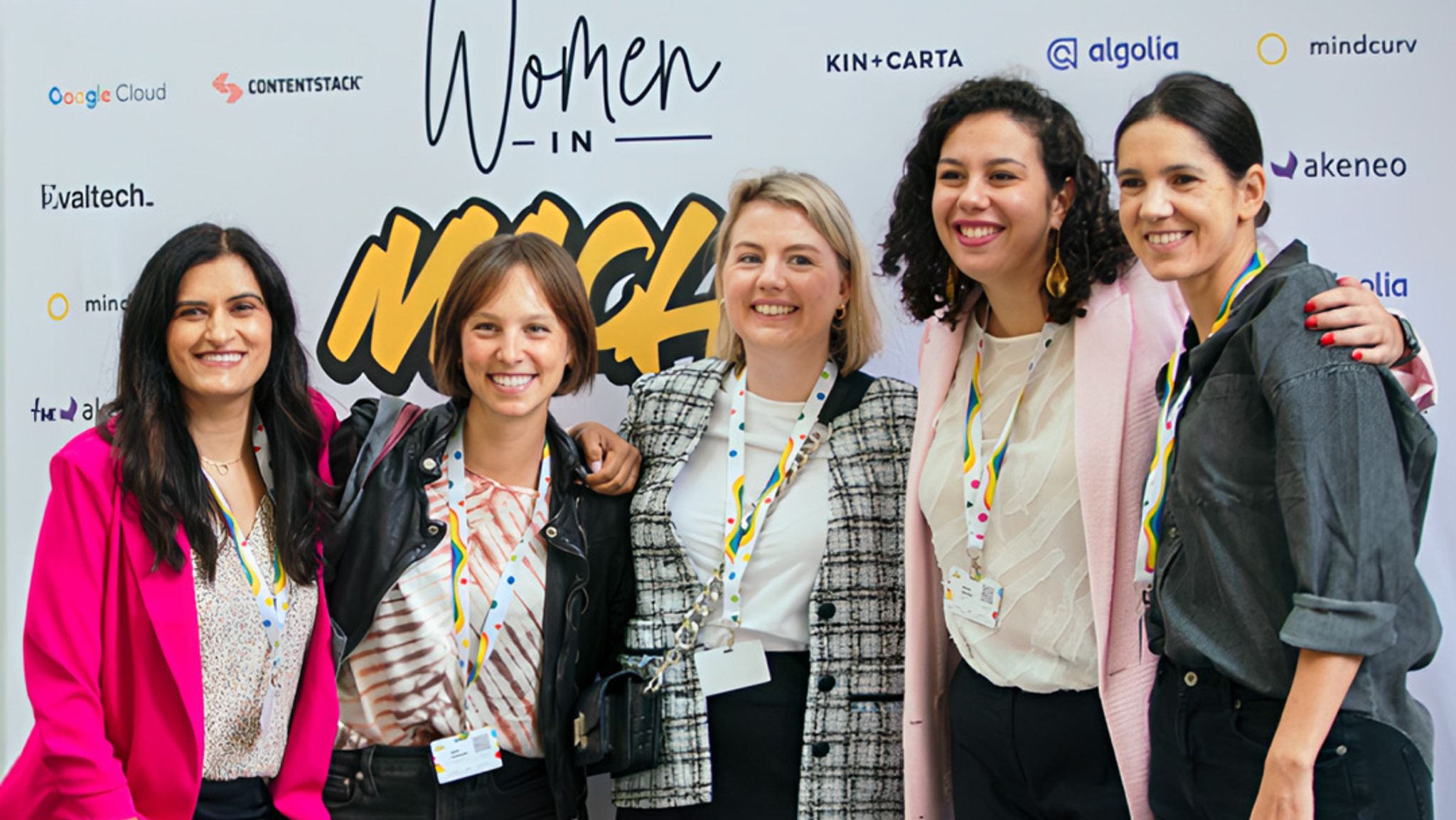
Designed to break down barriers to success within DEI programs, the new resource provides an easy method for tech companies to score their diversity, equity, inclusion, and belonging efforts in a neutral and actionable way.
The MACH Alliance has always maintained a fiery passion for challenging the status quo and tearing down walls. Its zeal has been reflected in the championing of composability and a persistent quest for open, best-of-breed technology ecosystems.
Since its founding in 2020, the organization has also become an ambassador for change within the “human” architectures of technology organizations, specifically around the advancement of diversity, equity, and inclusion (DEI) initiatives.
This commitment is manifested in the Alliance's core values and expressed in the development of programs and resources to help guide technology companies to a more meaningful posture around social responsibility, sustainability, and DEI. Initiatives like the Women in MACH program best exemplify its motivations, elevating the voices of women across their MACH membership community and serving as a template for the broader technology landscape.
Last week, the not-for-profit advocacy group introduced a new resource to help tech companies gain clarity and divine actionable insight for improving their DEI efforts. The Women in MACH DEIB Scoring Tool is a novel solution designed to accurately measure, track, and improve an organization’s diversity, equity, inclusion, and belonging – specifically in the MACH space.
That last piece about “belonging” is a differentiated aspect of the tool’s ethos. While not a new addition to the traditional DEI TLA (three-lettered acronym), belonging has gained traction in certain corners of organizational culture.
A number of universities, for example, have been spearheading the evolution of DEI and wrapping the concept of belonging into their toolboxes. In this vertical use case, belonging speaks to an individual student or faculty member’s perceived sense of connectedness and the feeling of being accepted, respected, and valued by their peers and community.
The same holds true for employees at tech companies, where belonging has taken on a new imperative within the DEI rubric. Measuring how an organization supports and engages with team members is becoming a key component for reinforcing the well-being of its people, which ultimately translates into better performance and outcomes. HR departments are embracing more of an intersectional lens to support employee growth, and adding belonging to the classic DEI methodology is becoming an important part of an evolving strategy.
While many enterprises have invested in DEI – including the appointment of dedicated executive leadership – there is still significant work to be done. This is where the DEIB Scoring Tool comes in, providing a layer of insight for organizations to enhance the maturity of their programs.
“Launching a simple yet powerful tool to advance efforts around DEIB has been our overall goal in developing the DEIB score,” said Rabea Tamm, Senior Director of Diversity, Equity, Inclusion & Belonging at commercetools. “I am convinced that the tool will provide clear guidance on the next step for any organization on their journey towards more equity. Offering it for free for MACH Alliance member companies is our contribution to pushing for progress broadly.”
Identifying the need for a DEIB solution
The primary goal of the new MACH DEIB Scoring Tool is to break down any barriers to success within a tech company’s DEI initiatives. It does this by providing an easy-to-use online survey that collects, aggregates, and scores your results in a neutral manner. It then prescribes actionable resources in the form of best practices and strategies.
As Rabea Tamm noted, the DEIB Scoring Tool will be completely free for members of the MACH Alliance. This is a big benefit given that comparable products in the market can sometimes be quite expensive. For example, research tools like Qualtric's XM Platform provide granular capabilities for tracking DEI metrics but require some pricey commitments.
Downstream from more robust enterprise solutions, an organization could certainly launch its own DEI survey via marketing apps like Survey Monkey (they have an existing DEI template for this specific use case). The problem? It would lack the industry focus and MACH-centric intimacy the Alliance brings to the table.
Leaders within the Women in MACH program were motivated to implement a DEIB scoring tool that served its MACH membership. Given the available options, it became abundantly clear that a homegrown solution was the way to go.
“When looking at the existing DEIB tools, we were underwhelmed,” said Jasmin Guthmann, Executive Board Member of the MACH Alliance and Sponsor of Women in MACH. “The expensive ones didn't deliver enough value, and the free tools were weak. We didn't want to wait for change – we rolled up our sleeves and built our own. Because of a world without accessible, actionable DEIB insights? That simply doesn't compute.”
How the DEIB Scoring Tool works
The survey itself takes about 15 minutes to complete. The flow is broken into clear categories around topics that include Awareness & Communication, Policies & Processes, Learning and Development, Belonging & Engagement, Benefits & Services, Inclusion, and Hiring.
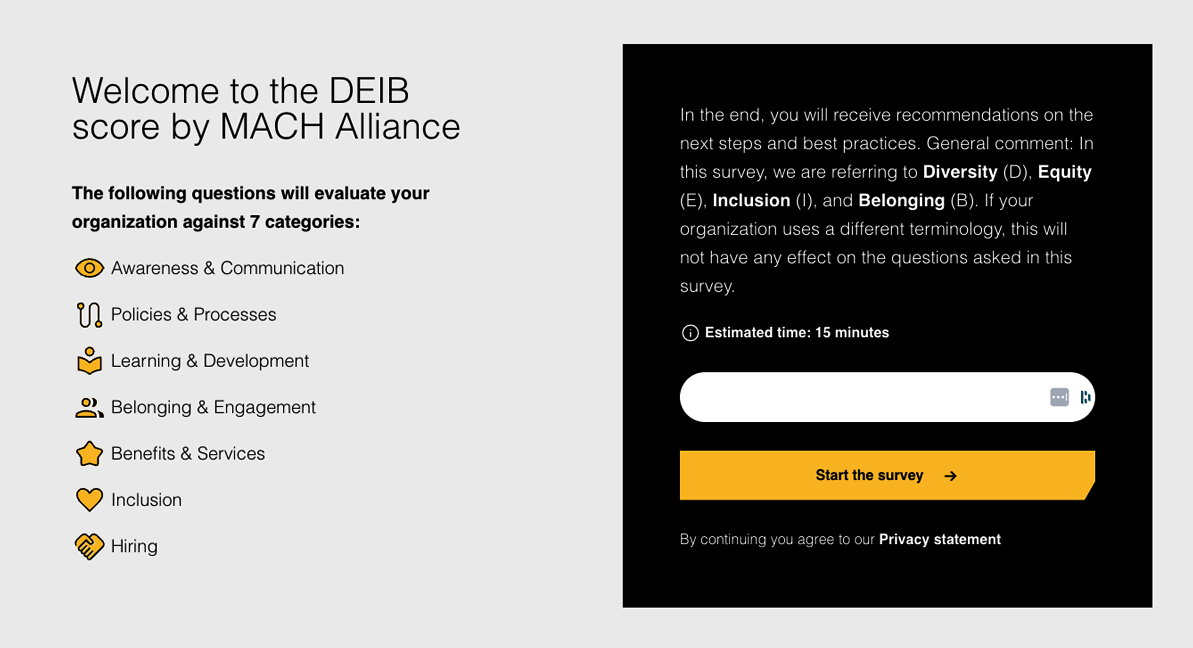
The login interface for the DEIB Scoring Tool
Most surveys leave little to be desired. And if we’re being honest, most of us would prefer to skirt participation (unless we’re over the moon or have an axe to grind). The fact that this is kind of enjoyable is a testament to its design and structure: the app’s UX is elegant, and the content is light-hearted and engaging. Everything is easy to navigate, and there’s a progress bar at the bottom that shows you exactly where you are in the flow – making it feel less cumbersome to complete.
Specific attention is paid to an organization’s maturity around substantive and declarative foundations for their DEI platforms, including questions about disability and neurodiversity statements. This might feel like table stakes, but many organizations still don’t have these DEI mechanisms built into their code of conduct or accompanied by any real enforcement. It also touches on the presence of anonymous reporting for policy infringement, which might be an overlooked component in many strategies.
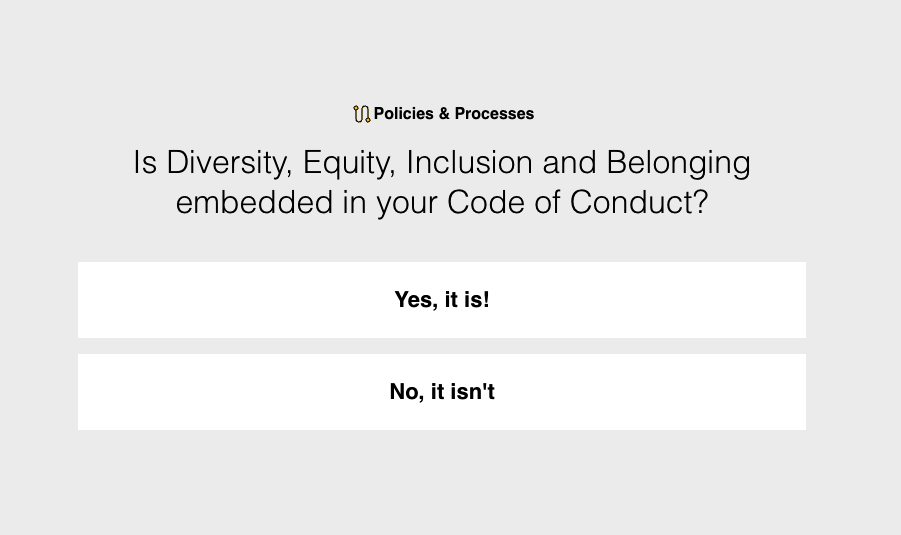
Survey question example from the DEIB Scoring Tool
There’s also a section on assessing your Environmental, Social, and Governance program, which consulting firms like Deloitte charge big bucks to develop. ESG is something of a hot potato in our current business and political climate, drawing criticism from certain corners of the private and public sectors. To be fair, some of the feedback is relevant, particularly around its lack of standardized measurement or value-based results.
Despite its naysayers, forward-thinking companies are taking a clear stand to be better citizens of the world by engaging in more sustainable practices. In fact, CMS vendors like Umbraco are publishing reports on this topic, providing transparency and reinforcing their commitments.
One highly relevant area of the survey deals with paid family and special leave care. This is a major topic across geographies, but also one coming under scrutiny in the U.S. presidential race, particularly around working families and affordable child care. More proactively, the survey also asks if there are mental health resources on staff, which might be reserved for large enterprises but could also manifest in third-party services.
Tallying up the score
Before submitting your survey, you have a chance to review and edit your full scope of replies. Once submitted, the data is tabulated and analyzed in a few seconds.
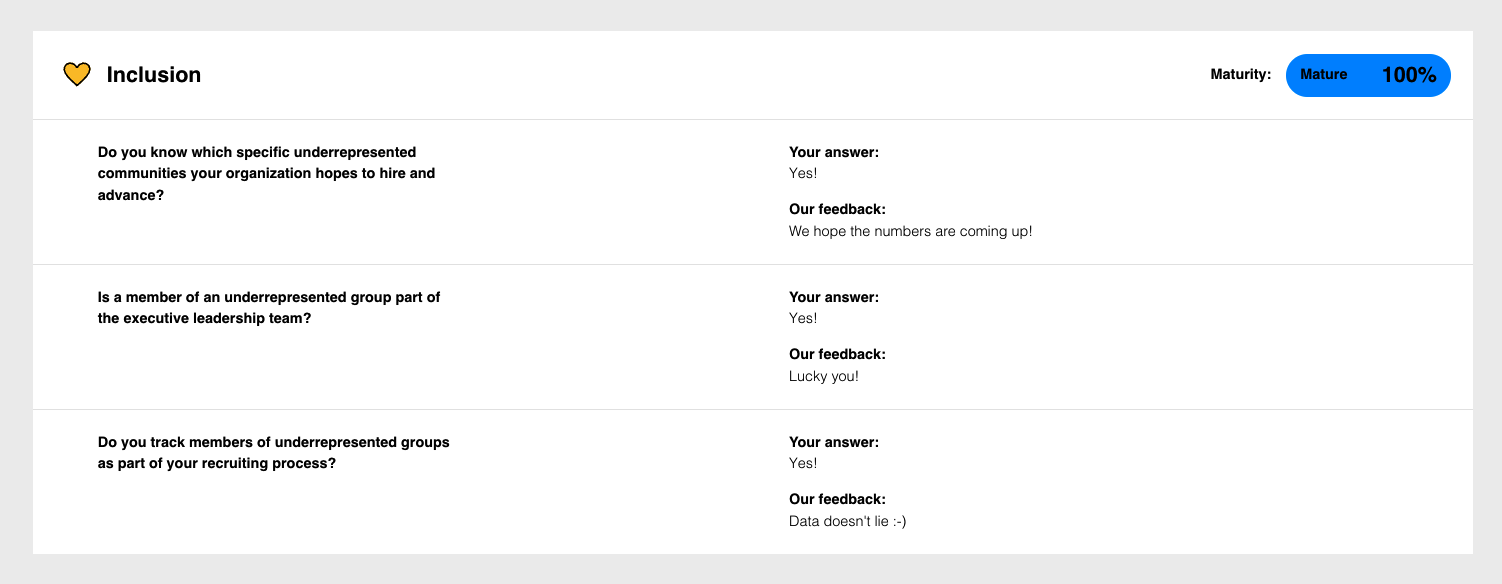
Reviewing results from the DEIB Scoring Tool
The report itself includes a simple histogram accompanied by a clear DEIB maturity scale that scores your performance. It also includes the individual results within each of the aforementioned categories.
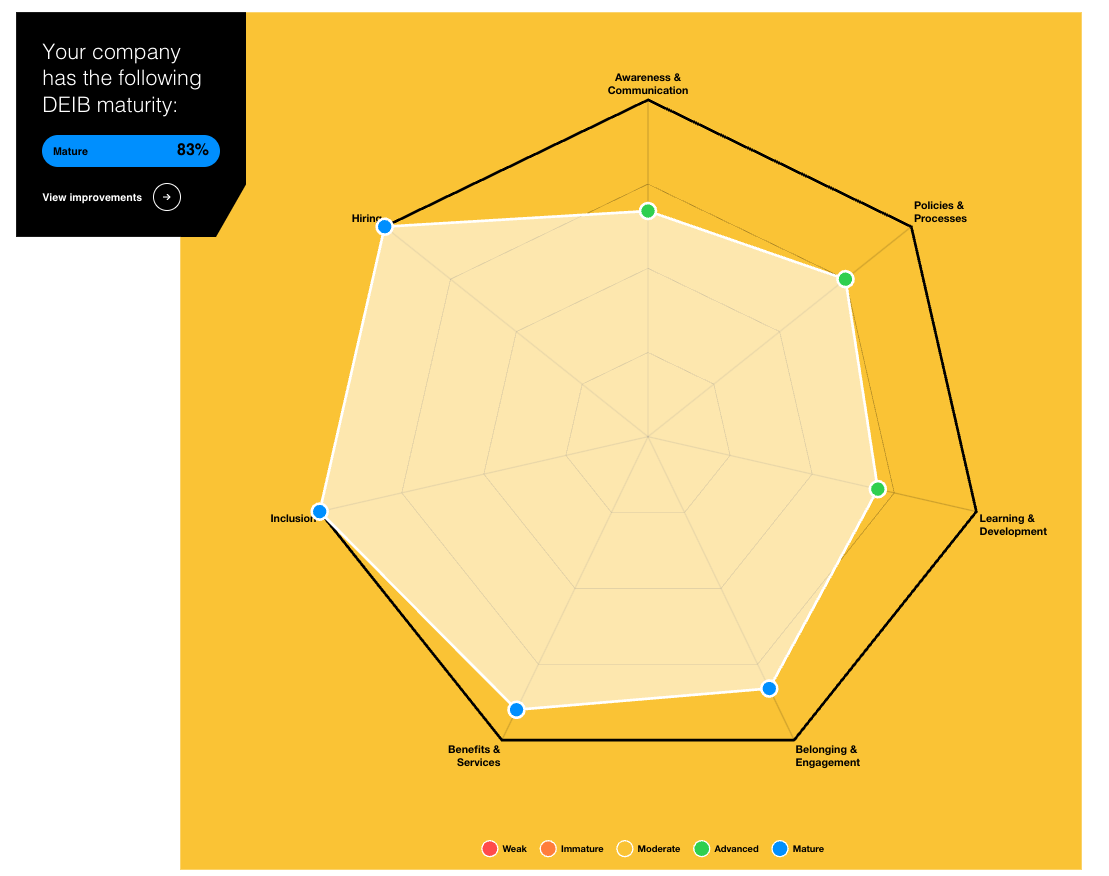
A visual model mapping your DEIB maturity
There’s a dynamite stinger: participants who achieve a “Mature” ranking are provided with a Women in MACH badge reflecting their status. The graphic can be downloaded and shared publicly to promote your organization’s MACH DEIB achievement.
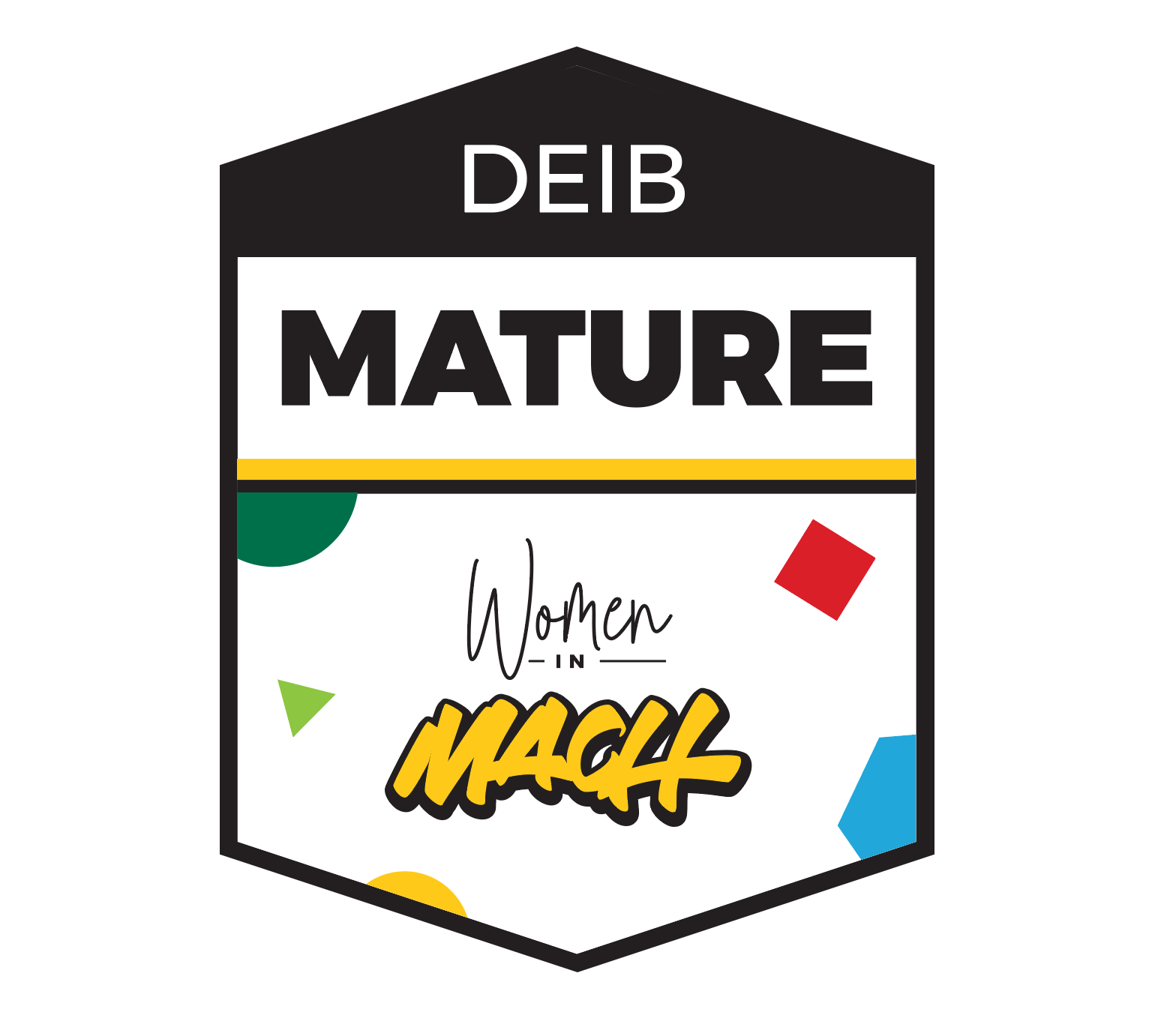
For participants who still have work to do (and let’s face it, we can all do better), the tool provides guidance in the form of a DEIB Playbook. The idea is to develop pathways for improvement that lead to rescoring and ultimately earning a “Mature” status.
Like any survey, there are a few things that could be augmented or streamlined. While this tool might appeal to multiple roles within an organization, it’s clear that DEI, HR, and cultural agents might be the most keen on its potential. For anyone outside those walls, it would be helpful to feature informational prompts within the survey itself – like what formalized Employee Resource Groups (ERGs) might encompass. Stuff that's easily Googled, BTW.
Aside from that, it’s a very lightweight experience, focusing on the most pertinent challenges relevant to DEIB success through a MACH lens – and delivering relevant, enlightening, and actionable results.
Why it matters
In 2023, I attended a conference where Casper Rasmussen, Global SVP at Valtech and (at the time) President of the MACH Alliance, guided an interactive discussion on social responsibility.
Throughout his talk, Rasmussen hammered home a simple mantra: “It's not just what's best for me, but best for we.” This seemed to wrap neatly around his call for modern businesses to make strong commitments to being open, sustainable, and “future fit” around goals that aren’t just commercially motivated.
What stayed with me was a comment from an attendee that surfaced during the open forum. I’m paraphrasing, but this individual reflected a level of anxiety around progressive programs – particularly those within ESG – suggesting that they sounded good, but only if the current economics permitted such an investment.
Said more plainly: if a recession were impacting tech and the broader market, these kinds of programs would be out the window.
Is that the reality?
Perhaps it has been – but it shouldn’t be. That mindset represents the easy path, not the right one. The fact is, we have far more to gain by embedding sustainability, diversity, and equality into our business practices at a fundamental level.
Over the years, I’ve taken a keen interest in the Women in MACH program because it’s doing great work. But more importantly, it needs allies – particularly from those of us who are white, cisgender males in an industry where we have dominated leadership roles.
Likewise, technology businesses need allies to guide the shape and direction of these investments. Having tools to codify progress and achievement is one way to reinforce the bedrock, especially if those systems are purpose-built for the industry and available in an open source vein.
To be clear, women have fought to achieve so much. But as we saw at the MACH Two conference last year, the vast majority of attending companies were still represented by men. This resulted in a public challenge to include more diversity across the ecosystem. As the new DEIB Scoring Tool queries in the survey: Do you have an underrepresented group as part of your executive team? If not, what are you willing to do about it?
While the MACH Alliance’s new tool is a terrific resource for auditing your posture, it’s far from being a panacea. It reminds me of how companies might use Siteimprove or Monsido to scan their websites for accessibility – it's a great first step, but real accessibility requires more humans in the loop, and a philosophical and cultural approach to design, implementation, and continued maintenance of their digital experiences.
In other words, a tool is just the beginning. It’s what you do with it that matters.
I previously mentioned the urgent need for “allies.” Perhaps it’s fitting that these programs are coming from an industry “alliance” within the MACH community, where diverse technologies – and people – find harmony. From DEIB tools to education, it says a lot that the MACH Alliance is continuing to invest heavily in this part of the equation.
It is, after all, the reason why we’re building and innovating: to improve the lives of humans.

CMS Kickoff 2025
January 14-15, 2025 – Tampa Bay Area, Florida
Join us next January in the Tampa Bay area of Florida for the third annual CMS Kickoff – the industry's premier global event. Similar to a traditional kickoff, we reflect on recent trends and share stories from the frontlines. Additionally, we will delve into the current happenings and shed light on the future. Prepare for an unparalleled in-person CMS conference experience that will equip you to move things forward. This is an exclusive event – space is limited, so secure your tickets today.